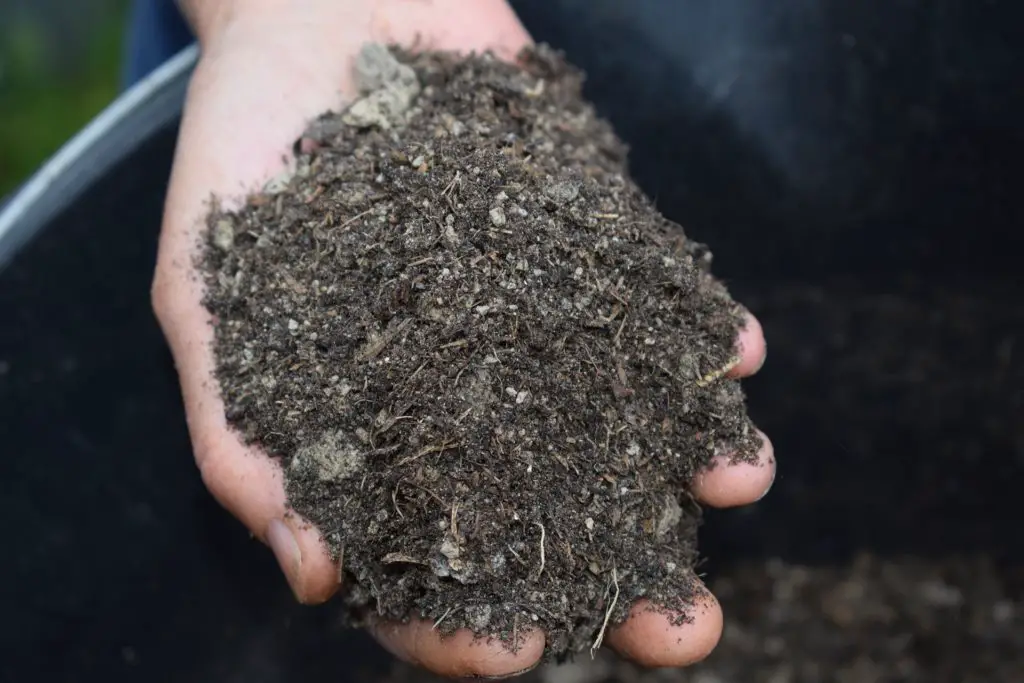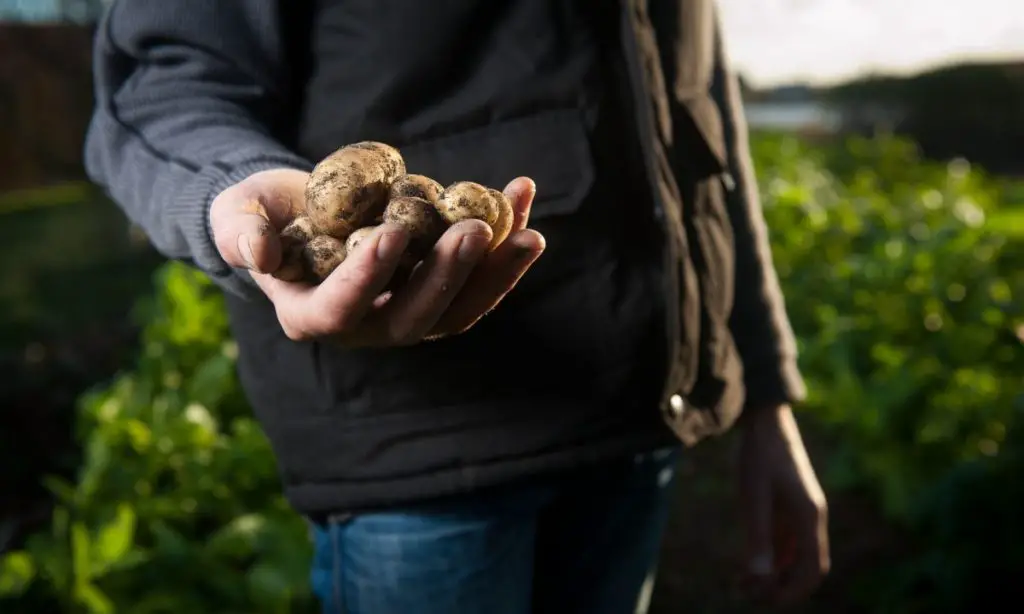If your homegrown potatoes are so small that they practically don’t exist, then, my friend, continue reading as this blog post will look at 9 eye-opening reasons why homegrown potatoes can be so small, and how you can increase the size of homegrown potatoes.
Table of Contents
9 Reasons why homegrown potatoes are small
Lack of Water
One of the most common reasons why homegrown potatoes are smaller than the ones you buy at the grocery store is because they lack water. Potatoes don’t actually like to be watered often, but they need to be watered consistently. If you’re not sure how to water them, you’re probably not getting enough water into them.
Nutrient Deficiency
You probably don’t think about nutrients when you’re enjoying a plate of boiled potatoes. But if you’re growing your own potatoes in the backyard or in a garden, you should. Nutrients are essential for healthy potatoes. If your homegrown potatoes are small and ugly, chances are that your soil is missing a vital nutrient that potatoes need to grow.
Insufficient Sunlight
Potatoes grow best in soil that has plenty of sunlight. Most people don’t realize that potatoes are a type of root vegetable. They need sunlight to grow, just as carrots and onions do. If you planted your potatoes in a shady area or in a place where they don’t get a lot of sunlight, they would not grow as big as they could have and you will end up having small potatoes.
Pest Attack

Your homegrown potatoes are small. Is it a disease? Too much water? Too little? Sunlight? Maybe it’s all of the above, but pests are definitely a possibility. And you don’t need to be a potato expert to know it. The most common pest to the potato is the Colorado potato beetle. These small, metallic-colored beetles are easy to spot on the outside of the potato. But what you may not know is that they can also burrow their way into your potato and consume the inside flesh.
So, if you see holes in any of your potatoes and they turn out to be small, you may have a Colorado potato beetle infestation.
Early Harvesting
The potatoes you plant will grow into large plants with many leaves. The leaves are not really left at all, but they look like them and they help the plant to make energy. When the potato is ready to be harvested, the leaves start to grow small and yellow and the leaves that are higher up on the plant start to die and fall off. This is a clue that potato is now ready to be harvested. But, if you have not waited for 2 to 3 weeks for the plant foliage to be died back to harvest your potatoes will definitely be small.
So why be in a hurry? Why not wait for 2 to 3 weeks after the plants stop flowering?
Fertilizer Imbalance
When growing potatoes, you may want to keep an eye out for foliage and make sure it doesn’t turn green. Green leaves are a sign of too much nitrogen being supplied in the soil, and can actually lead to stunted growth. Potatoes will often give off a lot of green leaves that most would believe is a good sign, right? Not always. Instead, offer your potato plants fertilizer that is not as high in nitrogen through either organic or chemical sources so they spend their energy on forming tubers instead of leaves!
No pH Testing Before Planting Potatoes
One of the reasons why your homegrown potatoes are small is that probably you did not test the pH of your soil before planting your delicious potatoes. Potatoes grow in the soil having a pH of 5 to 6 or 6 to 6.5. If you’re growing your own potatoes, you must test the pH of the soil before planting. The pH of your soil can definitely affect the size of your potatoes. To ensure proper provision of nutrients you need to plant your potatoes in soil that has the right pH level to absorb the nutrients.
High Temperatures
The soil may be moist, the sun may shine, and the nutrients may be sufficient, but if you live somewhere where summers get really hot it’s still possible you might have a potato problem. Potatoes are a cool-weather crop so extremely high temperatures decrease both how many tubers form as well as their size.
Over-Crowding of Plants
In the case of homegrown potatoes, sometimes the plants are too close together and they end up competing with each other. This can cause them to grow smaller. When two potato plants grow too close together, they end up competing for the same resources. They compete for water and nutrients in the soil, as well as sunlight. If the plants are too close together, the smaller plant will not get enough sunlight and will grow smaller.
Tips for Growing Bigger Potatoes
Add Compost for water retention

Growing potatoes in a raised bed filled with fertile, well-drained soil is a must as it will ensure the good size of your potatoes. And talking about compost, apart from being a wonderful supplement for your garden it is a great soil enhancer and helps to keep the soil evenly moist. It helps to improve the drainage of your soil and the water retention capacity of your soil. This certainly means that you may see a noticeable increase in the size of your potatoes.
Ensure Proper Spacing to avoid overcrowding
Plant your potatoes in rows that are spaced at least 1 foot apart. To avoid overcrowding, plant your potatoes in hills with a minimum of 3 feet between hills. If you have heavy soil, plant your potato hills 6 feet apart.
Guarantee Proper Sunlight
What could be more enjoyable than planting a garden and watching your potatoes grow? It’s also a wonderful feeling to watch your hard work pay off in the form of delicious, homegrown potatoes that are perfect in size. For that, you will have to ensure that you provide your plants with the right sunlight. Providing proper sunlight is the most important step in growing big potatoes. You should choose a place which receives 6 to 8 hours of sunlight per day.
PH Testing Prior To Planting Potatoes
Always keep PH testing in your mind before planting your potatoes. You can easily test the PH level in your garden soil by using a simple PH test kit. This will tell you what the PH level is and if it is at the right level for your potatoes. You can easily take a sample of your soil and test it. If the PH level is too high or too low, you can use something like a fertilizer (which will boost the PH level) or lime to bring it to the right level so that your potatoes can flourish.
Conclusion
I hope you enjoyed our blog about why your homegrown potatoes are so small and you will take the remedial measures into consideration in the future. Happy planting!


Pingback: 5 Best Ways to keep Homegrown Tomatoes from Splitting - Kitchen n Gardening Pro
Pingback: 5 Reasons Why My Cucumber Leaves Are Turning White - Kitchen n Gardening Pro
Everything is very open with a clear clarification of the issues.
It was really informative. Your site is very useful.
Thank you for sharing!
Very good article. I definitely appreciate this website. Continue the good work!
Your articles are very helpful to me. May I request more information?
I want to thank you for your assistance and this post. It’s been great.
Thank you for posting this. I really enjoyed reading it, especially because it addressed my question. It helped me a lot and I hope it will help others too.
The articles you write help me a lot and I like the topic
Please tell me more about this
Simply wish to say your article is as surprising. The clearness in your post is just great and i can assume you’re an expert on this subject. Well with your permission let me to grab your feed to keep up to date with forthcoming post. Thanks a million and please continue the rewarding work.
Thank you for posting such a wonderful article. It helped me a lot and I adore the topic.
I’m really impressed with your writing skills as well as with the layout on your blog. Is this a paid theme or did you customize it yourself? Anyway keep up the nice quality writing, it is rare to see a nice blog like this one nowadays..
F*ckin? remarkable things here. I am very glad to see your article. Thanks a lot and i’m looking forward to contact you. Will you please drop me a mail?
I have seen that nowadays, more and more people are now being attracted to cameras and the area of images. However, like a photographer, you need to first commit so much of your time deciding the model of photographic camera to buy and moving out of store to store just so you might buy the least expensive camera of the trademark you have decided to settle on. But it will not end now there. You also have to contemplate whether you should obtain a digital digicam extended warranty. Thx for the good tips I gained from your blog site.
I just could not depart your web site before suggesting that I really loved the standard information a person supply for your visitors? Is going to be again regularly to check out new posts
I have recently started a website, the info you offer on this web site has helped me greatly. Thank you for all of your time & work.